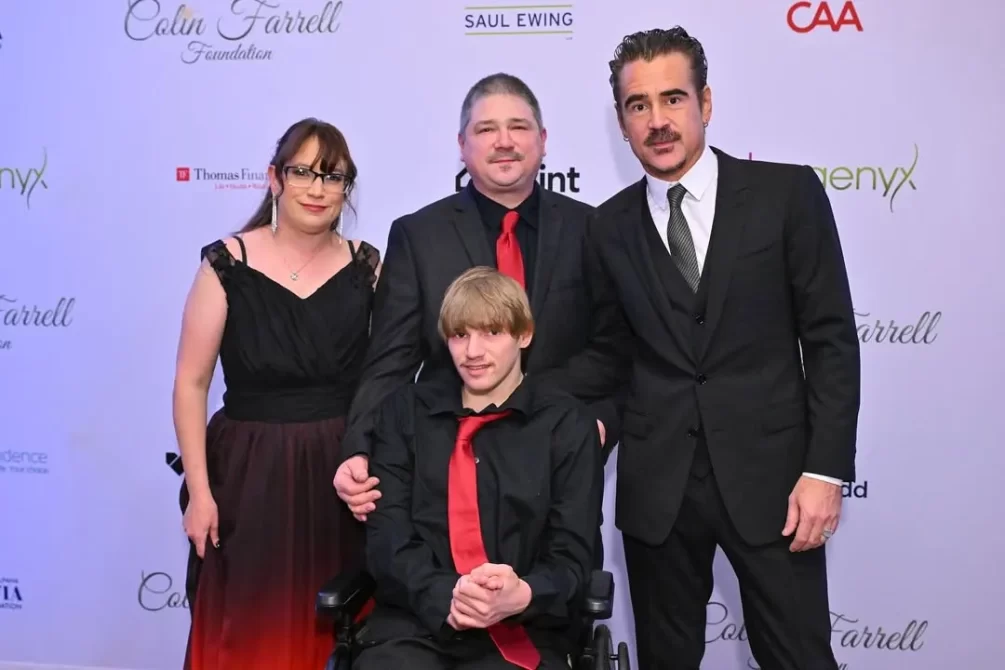
Hollywood has a way of projecting only the glamorous sides of celebrity lives. The award shows, red carpets, premieres, and picture-perfect Instagram stories. But behind the scenes, these celebrities face real-life challenges. For Irish actor Colin Farrell, one of those challenges is personal. The actor has been raising a child with Angelman syndrome.
His 21-year-old son, James, has lived with this rare neuro-genetic disorder since birth. Recently, Farrell made the difficult decision to move James into a long-term residential care facility. It’s a choice no parent makes lightly, and Farrell shared that “It was the hardest decision,” but it was the right one—for James, for his future, for his independence.”
Colin Farrell’s son has lived with Angelman syndrome since he was an infant
View this post on Instagram
Colin Farrell’s decision to place James in long-term care wasn’t sudden. As his son turned 21, Farrell revealed that he and Kim Bordenave, James’ mother, began asking difficult questions: What happens if something happens to them? Who would care for James? Would he be safe? The more we thought about it, the clearer it became,” Farrell said. “We needed to prepare him, and ourselves for a time when we might not be around.”

Colin Farrell described the process of moving him as heartbreaking. However, he revealed that they were preparing for a future in which his son would be supported even when he and James’ mother, Kim Bordenave, could no longer provide daily care. “We’re still going to be there, every step of the way. Just in a different capacity,” he said. The choice to transition James into residential care was to ensure consistency, safety, and most especially to protect him from being a “ward of the state.” He added that the decision was tricky because he wanted to take care of his son himself, but he also had to think long-term.
The actor also recalled the challenges in raising his son, he talked about how James didn’t walk until he was four years old, and when he finally did it was a huge breakthrough. “There wasn’t a dry eye in the house,” Farrell said. “We’d waited for it for so long. And when it happened, it was like watching someone conquer Everest.” He also shared that even in moments of difficulty, his son always seemed to radiate joy. “He can’t speak, but he communicates with such clarity. He’s taught me more about presence and patience than anyone else.”

Colin Farrell is now an advocate for the syndrome
Angelman syndrome affects approximately 1 in 15,000 people. People with the syndrome experience developmental delays, challenges with speech, motor coordination issues, and frequent laughter or smiling. They also typically require lifelong care.

Farrell has never shied away from sharing his family’s experience. He first spoke publicly about James’ condition in 2007, after years of quietly going through doctor visits, therapies, and emotional learning curves. “James changed everything for me,” he once said. “He redefined what strength looks like.”
Through his journey, Farrell has become more than just a father; he’s become an advocate. In 2024, he launched the Colin Farrell Foundation, which focuses on the needs of adults with intellectual and developmental disabilities, including those with Angelman syndrome. “There are so many families like ours,” he said. “And the support drops off once your child turns 21. That’s not okay.”

The foundation focuses on housing, education, community programs, and policy reform. “We’re building something that lasts,” Farrell explained. “Something that can ease the weight for families and offer dignity for those who deserve more than just survival.” While the change is huge, Colin Farrell remains involved in his son’s life.
